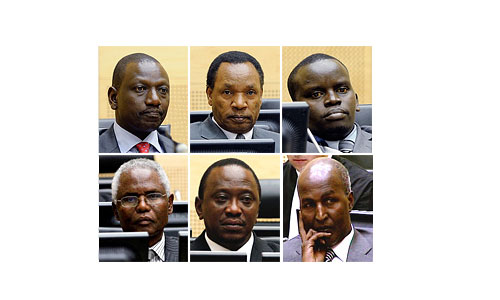On 31 March 2010, Pre- Trial Chamber II authorised investigations into the 2007-2008 Post-Election violence in Kenya. It is KPTJ’s hope that the investigations will lead to the prosecution of those bearing the greatest responsibility for the post-election violence.
Indeed, KPTJ supports the International Criminal Court’s involvement in Kenya, as a step towards ending the culture of impunity, and creating accountability for politically instigated violence.
KPTJ is a coalition of over 30 Kenyan and East African legal, human rights, and governance organisations, together with ordinary Kenyans and friends of Kenya, convened in the immediate aftermath of 2007’s presidential election debacle. KPTJ maintains that there can be no peace without justice – political, economic, and social – for all Kenyans. Justice requires that we face the truth of our history, and of the 2007 election, to address the deep chasms and inequities in Kenyan society.
The aim of this bulletin is to provide readers with an informative view of the ICC process and functions as it applies to Kenya. Given its mandate to obtain justice for the post-election violence, KPTJ has a duty to educate the public about the ICC, as in recent times there has been an accumulation of misinformation, which has led to unrealistic expectations.
Background
In the past 50 years, there have been many crimes against humanity and appalling war crimes for which no individuals have been held accountable. Historically, although states have prosecuted people from other countries for crimes against humanity, they have generally been less willing or able to put their own nationals on trial. One recent solution has been temporary international criminal tribunals established by the United Nations.These have tried people for war crimes and other serious international crimes following, for instance, the Rwanda genocide in the 1990s (The Rwandan Civil War) and the conflict in the former Yugoslavia (The Bosnian War).
However, because they were established to try crimes committed only within a specific time frame and during a specific conflict, there was general agreement that an independent, permanent criminal court was necessary.
On 17 July 1998, the international community reached a historic milestone when 120 States adopted the Rome Statute, the legal basis for establishing the permanent International Criminal Court (ICC). Effective since 2002, the ICC is a permanent international institution established for the purpose of investigating and prosecuting individuals who commit the most serious crimes of international concern, namely, genocide, crimes against humanity, and war crimes.

 Kenyans for Peace with Truth and Justice (KPTJ)
Kenyans for Peace with Truth and Justice (KPTJ)